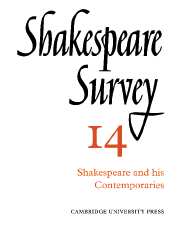Book contents
- Frontmatter
- Studies in Elizabethan and Jacobean Drama since 1900
- Shakespeare and Lyly
- Shakespeare and Mundy
- Marlowe as Provocative Agent in Shakespeare’s Early Plays
- The Tragedy of Revenge in Shakespeare and Webster
- The Simplicity of Thomas Heywood
- The Tragic Vision of Fulke Greville
- Shakespeare v. The Rest: The Old Controversy
- Shakespeare’s Gentleness
- Milton on Shakespeare
- An Unrecorded Elizabethan Performance of Titus Andronicus
- Stratford-upon-Avon a Hundred Years Ago
- International Notes
- Shakespeare Productions in the United Kingdom: 1959
- Three Directors: a Review of Recent Productions
- The Year's Contributions to Shakespearian Study 1 Critical Studies
- 2 Shakespeare’s Life, Times and Stage
- 3 Textual Studies
- Books Received
- Index
- Plate section
Shakespeare and Mundy
Published online by Cambridge University Press: 28 March 2007
- Frontmatter
- Studies in Elizabethan and Jacobean Drama since 1900
- Shakespeare and Lyly
- Shakespeare and Mundy
- Marlowe as Provocative Agent in Shakespeare’s Early Plays
- The Tragedy of Revenge in Shakespeare and Webster
- The Simplicity of Thomas Heywood
- The Tragic Vision of Fulke Greville
- Shakespeare v. The Rest: The Old Controversy
- Shakespeare’s Gentleness
- Milton on Shakespeare
- An Unrecorded Elizabethan Performance of Titus Andronicus
- Stratford-upon-Avon a Hundred Years Ago
- International Notes
- Shakespeare Productions in the United Kingdom: 1959
- Three Directors: a Review of Recent Productions
- The Year's Contributions to Shakespearian Study 1 Critical Studies
- 2 Shakespeare’s Life, Times and Stage
- 3 Textual Studies
- Books Received
- Index
- Plate section
Summary
If we may trust the scanty contemporary references to him, Anthony Mundy was one of the most prolific and successful of Elizabethan dramatists; in Francis Meres’ opinion he was also one of the best. Yet very few of his plays are known to be extant, and even those have been identified as his only in modern times. Until Henslowe’s theatrical account-book was discovered, no play by Mundy was known to have survived. Henslowe’s records revealed that The Downfall of Robert, Earl of Huntington, printed anonymously in 1598, had been written by Mundy, that its sequel, The Death of Robert, Earl of Huntington, also printed anonymously in 1598, was partly Mundy’s work too, and that he was one of the four authors of Sir John Oldcastle, printed (again anonymously) in 1600. Furthermore, Henslowe’s accounts show that between 1597 and 1602, and for the Admiral’s company alone, Mundy wrote or collaborated in twelve other plays, all now lost. Just over a hundred years ago knowledge of Mundy’s original plays was greatly increased by the printing, for the first time, of the manuscript of his John a Kent and John a Cumber. In the present century Fedele and Fortunio, an adaptation of an Italian play by Luigi Pasqualigo, has been established as Mundy’s beyond any doubt; it had been printed as early as 1585. Finally, but only as late as 1913, it was discovered that Mundy had a hand in another and more important play, Sir Thomas More.
Although historians of Elizabethan drama are now better equipped than ever before to judge for themselves the quality of Mundy's playwriting, they should, nevertheless, continue to keep in mind that most of his plays have been lost. We know that he wrote for other companies as well as for the Admiral's, but not for how many nor over what period. He was writing plays at least as early as 1584 and as late as December 1602, but there is no reason to suppose that those dates mark either the beginning or the end of his playwriting. Furthermore, there are no grounds for believing that his extant plays are his best, or that they are in any way necessarily representative. Except perhaps for the earliest, Fedele and Fortunio, the few that we possess have come down to us obviously by chance, and certainly not through any action taken by Mundy himself.
- Type
- Chapter
- Information
- Shakespeare Survey , pp. 25 - 33Publisher: Cambridge University PressPrint publication year: 1961
- 5
- Cited by



